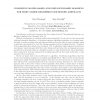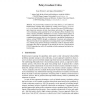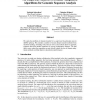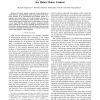688 search results - page 83 / 138 » Using reinforcement learning to adapt an imitation task |
ML
2002
ACM
13 years 7 months ago
2002
ACM
We present a general approach to model selection and regularization that exploits unlabeled data to adaptively control hypothesis complexity in supervised learning tasks. The idea ...
ICML
2005
IEEE
14 years 8 months ago
2005
IEEE
T ORDER REGRESSION (EXTENDED ABSTRACT) Kurt Driessensa Saso Dzeroskib a Department of Computer Science, University of Waikato, Hamilton, New Zealand (kurtd@waikato.ac.nz) b Departm...
ECML
2007
Springer
14 years 1 months ago
2007
Springer
We present Policy Gradient Actor-Critic (PGAC), a new model-free Reinforcement Learning (RL) method for creating limited-memory stochastic policies for Partially Observable Markov ...
NIPS
2008
13 years 9 months ago
2008
We study the problem of domain transfer for a supervised classification task in mRNA splicing. We consider a number of recent domain transfer methods from machine learning, includ...
ICRA
2007
IEEE
14 years 2 months ago
2007
IEEE
— The least squares approach works efficiently in value function approximation, given appropriate basis functions. Because of its smoothness, the Gaussian kernel is a popular an...




